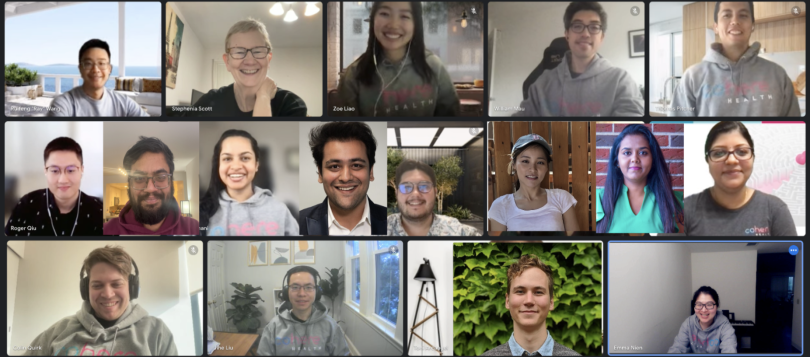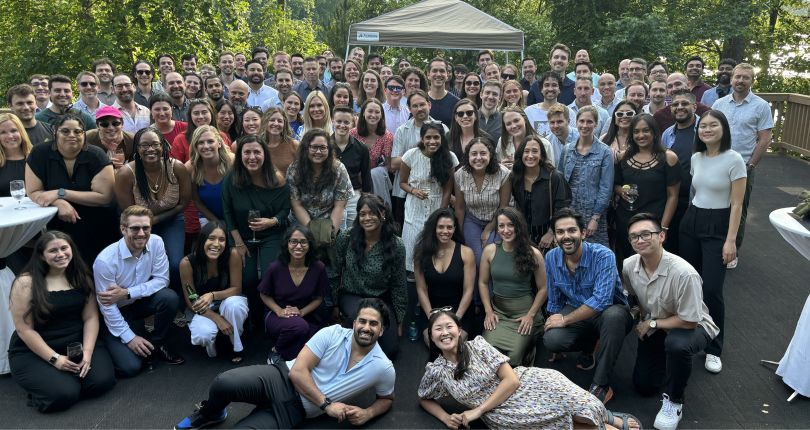In the world of data science, where algorithms and numbers rule the day, it could be easy to assume that technical prowess is the be-all and end-all. But the secret to success isn’t just in mastering Python, R or the latest machine learning frameworks; rather, so-called “soft skills” — like communication, adaptability, collaboration and problem solving — take that technical expertise and help data scientists turn insights into action across the business.
Picture this: A brilliant data scientist at a fast-growing tech startup is a wizard with code. Give this wiz a dataset, and they’ll conjure insights that can make any CEO’s eyes gleam with dollar signs.
But there’s a hitch: Without being able to communicate these findings to nontechnical stakeholders, the dazzling insights can get lost in translation.
With the right soft skills up their sleeve, this data scientist can use those insights to transform projects and support meaningful change.
A knack for storytelling gives this data scientist the ability to weave data points into a narrative that resonates with the marketing team, the finance department and even the board of directors. Suddenly, those insights aren’t just numbers on a slide — they’re a compelling story driving business decisions.
Perhaps this data scientist is an adept bridge-builder, finding ways to collaborate seamlessly with software engineers, product managers and other domain experts. Or maybe their skills lie in creative problem solving, and this tech wiz is able to think outside the algorithmic box to uncover solutions that others might overlook.
The tech landscape evolves at a dizzying pace, and what’s hot today might be obsolete tomorrow. A curious data scientist is ready to continuously upskill, embrace new tools and methodologies and thrive amidst change — no matter how the industry shifts.
Each of these modalities help turn data scientists into leaders who can foster excellence in their own work and create a ripple effect elevating the work of their colleagues.
Built In learned more from five data scientists about how soft skills like storytelling, adaptability and collaboration have helped them level up their careers and serve as influential thought leaders within their organizations.
UL Solutions delivers testing, inspection and certification services, together with software products and advisory offerings in more than 100 countries.
What do you consider the soft skills most beneficial to have as a data scientist?
Communication and adaptability are important skills for a data scientist. Many of the projects data scientists receive begin with vague problem statements. Effectively working with stakeholders to really define the issue and create actionable work is critical to a successful project.
Additionally, keeping stakeholders informed and being able to explain complex solutions in simple terms keeps them invested in the project. This constant and open line of communication allows for real-time feedback and clear insights into shifting priorities, which helps you adjust as you go, saving time and avoiding major oversights often discovered at the end of a project.
Also, the tools used within data science are constantly evolving, so adapting to these new tools and using them in existing projects is vital to keeping our applications relevant and marketable.
Can you describe a time in which soft skills proved especially useful?
I’d say the ability to adapt and change has been important for almost every project I’ve worked on at UL Solutions. Most of the findings from projects I work on inspire new ideas or get people to think differently. From there, the project scope may change, or we may find that we need to adjust the solution. I say “people don’t know what they don’t know” when talking about data almost every day, so I am never surprised when we need to adjust our work to account for new revelations.
I have started projects and had a solution I thought would work well, but halfway through, I learned a new method and decided to pivot because it was more efficient. Refusing to deviate from the project’s original vision may lead to products that have no value-add. It can be frustrating to throw away work you’ve done, but if the stakeholders see value in what you provide, the project has been successful.
“The ability to adapt and change has been important for almost every project I’ve worked on. Refusing to deviate from the project’s original vision may lead to products that have no value-add.”
What advice would you give to other data scientists interested in strengthening their soft skills?
My advice is simply to talk to people! Whenever I mention that I work in data science, so many people tell me how interested they are in the field or in artificial intelligence. We end up having interesting conversations, and I usually learn something from them, too. So, talk to your colleagues, peers and even family about data science. It’s a win-win for both of you — you get to practice your communication skills by explaining complex issues in a digestible way, and they get to learn just how cool data science is.
When talking with people in a casual setting, you also develop the confidence you need to effectively communicate with stakeholders and higher-ups.

Cohere Health is a clinical intelligence company that provides intelligent prior authorization.
What do you consider the most beneficial soft skills to have as a data scientist?
Don’t confuse confidence with competence. Many data scientists often remain silent in team brainstorm meetings. When I speak with them one on one, they frequently express, “I don't feel confident enough to share my thoughts; they might sound stupid. I want to be sure.”
I encourage data scientists to become more comfortable with saying, “I am not sure about X, Y or Z, but I am confident I can try and learn.” Remember, the only foolish question is the one that goes unasked. So be confident in your ability to learn new things by asking more questions, and in doing so, you will grow your competence. Confidence follows competence, not the other way around.
“Confidence follows competence, not the other way around.”
Can you describe a time in which soft skills proved especially useful?
As mentioned earlier, be confident in your willingness to try and learn, even when facing something new. Initially, attempting a new technical approach, design or pipeline might feel uncomfortable. However, the results will surprise you. Either way, you’ll learn what works and what doesn’t, gaining knowledge you didn’t have before. Opportunities won’t wait for us to become competent first.
What advice would you give to other data scientists interested in strengthening their soft skills?
Whatever struggle you are experiencing right now signifies progress. Stepping out of your comfort zone is challenging, but it is essential for growth. This is how we uncover new insights from data by using innovative technical approaches.

Garner Health is a healthtech startup with two core offerings: Garner, a benefit program that uses data science and incentive accounts to help employees find doctors in their communities; and Garner DataPro, a provider recommendation platform.
What do you consider the most beneficial soft skills to have as a data scientist?
Data scientists need to have a good understanding of the business and product. Data science work that does not take into account business needs or falls outside of the product vision will usually be less impactful than the work that attempts to identify and solve the pain points that stakeholders, clients or users face. Having a good understanding of the business combined with a unique perspective solidifies data scientists as valuable partners in the business.
In order for that value to be realized, data scientists must successfully work in cross-functional teams. Good communication is crucial to interact effectively with colleagues with different skill sets.
Finally, a soft skill that often does not receive as much attention as it deserves among data scientists is curiosity. Being curious about problems, the product and especially data provides a healthy amount of skepticism that can not only improve the outcomes of models and algorithms but also help the business as a whole make more effective decisions. Overall, I strongly believe that improved soft skills can transform a data scientist from a valuable contributor to an indispensable partner to the business.
“Having a good understanding of the business combined with a unique perspective solidifies data scientists as valuable partners in the business.”
Can you describe a time in which soft skills proved especially useful?
Recently, product managers identified a set of features that would be the most helpful in improving a company KPI. They asked a data scientist to help them prioritize those features by the predicted impact on the KPI. Instead of simply going through each feature and estimating its impact, I took the extra step to thoroughly understand why the specific set of features was proposed and what was hurting the KPI. After a deep dive into the data, I identified a different feature that would move the KPI more than any other feature in consideration and would also be less costly.
Kin + Carta is a global digital transformation consultancy and Certified B Corporation.
What do you consider the most beneficial soft skills to have as a data scientist?
It’s a toss-up between being able to translate technical concepts and storytelling; you can think of them as two sides of the same coin. As data scientists, we spend the majority of our day buried in data, algorithms and highly specialized jargon, and as with any speciality, it becomes second nature to us. It’s also what makes us passionate, and we want to share that passion. The key is to understand how to share that passion such that you don’t lose your audience, and that’s what the business is.
If you’re giving a presentation that reads like an academic paper in that you’re going through your problem statement, methodology, results and so on, you’ve lost them before you’ve gotten past the first slide. You must engage the business, and to be engaging, you must be able to effectively communicate in shared terminology. It is our job to use our skills to help the business make informed decisions, to explain what we found and how it is useful and relevant in terms they can understand and that captures their attention. If you can’t properly share your knowledge with those you are supporting, all value is lost.
“If you can’t properly share your knowledge with those you are supporting, all value is lost.”
Can you describe a time in which soft skills proved especially useful?
Currently, I am on a team putting together a presentation to showcase the value our organization has been bringing over the course of a key initiative. It is also our opportunity to underline what our work unlocks for the business. Because of the level of stakeholder to which this presentation will be given, we have been refining our message and presentation for months. We brainstorm the best way to visualize our story, the best way to narrow in on what is most important, and we revise and revise again. Months in, and we are still coming up with better ways to translate what we know and tell our story in a way that resonates.
The light-bulb moment that convinced me of the importance of translation and storytelling also provides a cautionary tale of what could happen when softer skills are ignored. I had a data scientist friend whom I greatly admired; we would spend hours talking about machine learning algorithms, the math behind them and new and exciting approaches to business optimization. Later I found out this person’s work was never used because what they provided was never understood by their business stakeholders.
What advice would you give to other data scientists interested in strengthening their soft skills?
Ask for feedback, ask for help, know your audience and practice, practice, practice. Before you send that email or Slack message, have a more senior team member review who can help you refine your message. Before making that presentation, practice with a friend who knows nothing about your field as they will be able to help you identify where you’re losing your audience, where you’re going into too much detail and where you might be reading like an academic paper. Understand who you’re communicating with and their level of understanding of the material or context. If you don’t know, err on the side of caution.
My general rule of thumb is: If my grandmother could understand what the takeaways, outcomes and recommendations are and remain interested, then I’m likely ready to present to the business. Don’t be afraid to not know or not be great at something yet — you’re never too seasoned to learn from a mentor. As a leader, when a team member asks for help and feedback, it directly builds my confidence and trust in them such that I know a quality product is being delivered to our stakeholders.
Arity is a mobility data and analytics company focused on improving transportation.
What do you consider the most beneficial soft skills to have as a data scientist, and why?
As a data scientist, it’s important to develop good active listening skills when discussing project opportunities with stakeholders. While stakeholders are typically experts in a business domain, they often have an incomplete understanding of what it takes to build a successful machine learning solution.
It’s critical to ask clarifying questions how a model-based solution will be used and about data sources available to develop the solution. Your goal should be to understand the broader problem domain, not just the proposed problem solution as it’s initially described. Listening closely, you can gain valuable information about how to properly reframe the business problem into a data science solution.
As you’re asking questions and listening to your stakeholders’ responses, think about ways you might structure the project. Zeroing in on a promising solution approach requires iteratively increasing your understanding of the business problem context, thinking through the implications for your solution approach, and refining over the course of the project, collaborating frequently with your stakeholders. This entire process benefits greatly from honing your active listening skills.
Can you describe a time in which soft skills proved especially useful?
Earlier in my career, I was leading a team working on a project to flag insurance claims for potential fraud. We had built several iterations of a model and were trying to get approval from our business stakeholders to move forward with an operational pilot. Our stakeholders were concerned that model performance was not looking as strong as initially expected and they wanted to see more iterations before being comfortable with a pilot.
It became a test of my negotiation skills. I invested in better understanding the business process, including the savings associated with avoiding payments on fraudulent claims and the costs of following up on fraud flags. I was able to reframe the conversation around the net benefit of savings versus investigation costs and the overall ROI, and I also spoke to the advantage of collecting a larger sample of real fraud investigation outcomes through the pilot, which weren’t available in the historical data. Eventually, we overcame the concerns and moved forward with a pilot and then a full-scale deployment. The model ended up saving the company hundreds of millions of dollars and was a real success story.
What advice would you give to other data scientists interested in strengthening their soft skills?
I would advise data scientists to invest in expanding their understanding of the domain in which they’re operating so they can more effectively collaborate with their stakeholders and better see opportunities for applying data science to make an impact. Seek out opportunities to spend a day in the life of the people that will be using your models, read articles about the problem domain, set up one-on-one meetings with subject matter experts. All of this will increase your understanding of the space you’re trying to impact, strengthen your ability to empathize with stakeholders and users and expand your capacity to architect the right solutions.
Successful data science lives at the intersection of domain understanding, statistical expertise and technical ability. The more you’re able to expand across all three, the more successful you’ll be as a data scientist.















